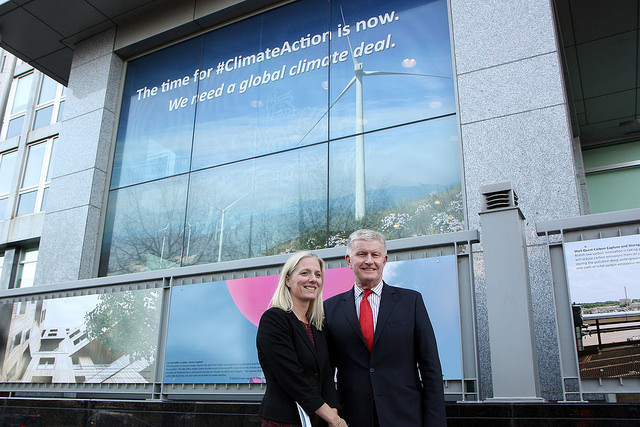rabble is expanding our Parliamentary Bureau and we need your help! Support us on Patreon today!
What are we to make of the Liberal government backing the 1.5 degree Celsius limit for global warming?
The Canadian Press reports, “At a closed plenary session on the weekend at the COP21 climate negotiations, [environment minister Catherine] McKenna was quoted saying that on ‘the question for framing the temperature goal, we support reference to striving for 1.5 as other countries have said.’ In the partial transcript provided by her office to The Canadian Press, McKenna goes on to say: ‘If we want to achieve this temperature goal, everyone needs to be part of this. We need maximum participation where everyone puts their best efforts forward.’ …[Her spokesperson has added] ‘We support the Paris agreement having language that says we should aim and strive towards limiting global warming to 1.5 degrees.'”
The Council of Canadians supports the 1.5 degree target, but there are some significant caveats to McKenna’s statement.
The National Observer notes, “[McKenna’s spokesperson says] ‘the most important thing is that each country should be legally required to submit a target. And to report on progress on that target on a regular basis.’ This is not the same as legally binding countries to reach their target, as many reports have noted. Countries’ targets will still be outside the agreement.”
And Maclean’s cautions, “But exactly what ‘voicing support’ [means] is unclear. McKenna told the other environment ministers that Canada supports including a ‘reference in the Paris Agreement to the recognition of the need to [strive] to limit global warming to 1.5.’ That stops short of asserting the limit should be 1.5 degrees… Canada is not asking that the 1.5-degree target be binding or even firm. It simply calls for language in the Paris agreement to urge countries to do their best. [The current] pledges presented by each country add up to anywhere from 2.7 to 3.7 degrees of warming.”
The Globe and Mail’s lead line on this story was that, “Canada has endorsed a call from small island nations to hold global warming to no more than 1.5 degrees Celsius above pre-industrial levels, putting Ottawa out of step with the United States, which has maintained a 2 C target.” But by late yesterday, the Guardian had clarified, “In the final push to a climate agreement, the U.S., Canada, China and the European Union declared they were now on board with demands from African countries to adopt an even more ambitious goal to limit warming.”
While Equiterre, ForestEthics and Environmental Defence praised the Canadian government’s position, other groups, like Friends of the Earth U.S. and the Indigenous Environmental Network, were more critical.
The Guardian report adds, “Campaign groups meanwhile said the aspiration to 1.5 C was far-removed from reality. …Erich Pica, the director of Friends of the Earth U.S., accused the rich countries of backing vulnerable states on the 1.5 C goal to crowd out bigger developing countries. ‘There is a dangerous push that developed countries are using on this push to 1.5 C to blur the lines,’ he said. ‘The U.S. and European countries are adopting the idea of 1.5 C as a mitigation target but they are blurring of the lines on what has to happen to have a just and fair sharing of the 1.5 C equation.'”
And in a media release the Indigenous Environmental Network stated, “Indigenous peoples from Canada, U.S. and the world were initially elated to hear [support for 1.5 degrees Celsius]… ‘What remains to be seen is how Canada aims to achieve this goal without a commitment to stop the expansion of the Alberta tar sands and its associated pipelines and begin the rapid transition to a renewable economy. This would be the real news and commitment that we want from Canada to deeply commit to responding to the climate crisis,’ [says Tom Goldtooth].”
We agree.
We have highlighted in numerous blogs that British researchers at University College London have concluded that 85 per cent of the tar sands would have to be left in the ground to limit global warming to 2 degrees Celsius. That study specified that no more than 7.5 billion barrels of oil from the tar sands can be produced over the next 35 years.
The proposed Energy East pipeline would move 1,100,000 barrels of oil a day. That means about 401,500,000 barrels per year. If the limit that can be drawn from the tar sands is 7,500,000,000 then that limit would be reached in about 19 years. That means Canada would hit its carbon budget within two decades with only the Energy East pipeline (no other pipelines, no other tar sands production). A 1.5-degree target would mean that deadline would come even sooner. And given the Liberals have also publicly supported an expansion of the tar sands and have not ruled out Energy East, their 1.5-degree promise lacks credibility.
Council of Canadians energy and climate justice campaigner Andrea Harden-Donahue says, “With ambitious targets must come ambitious actions. This means freezing tar sands expansion, rejecting both the Energy East and Kinder Morgan pipelines, and planning for a just transition towards a fossil free economy and society by 2050.”
For more on our energy and climate justice campaign, please click here.
Photo: British High Commission, Ottawa/flickr
rabble is expanding our Parliamentary Bureau and we need your help! Support us on Patreon today!



